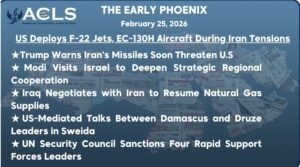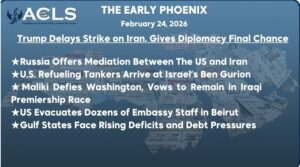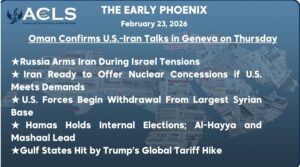Turkiye’s Elections Loom Large for the Rest of the World
By Ahmad Mumar
As Turkiye readies for its crucial elections, the results may significantly alter the domestic landscape, regional destinies, and international standings. Ahead of the vote scheduled for May 14th, the two primary coalitions vying for victory are still trying to develop their campaigns and coherent policy positions for all of Turkiye’s domestic and foreign policy issues. While still unclear, the dynamics of Turkiye’s future may help shape America’s foreign policy towards the whole region.
The United States should be keen to monitor the situation in Turkiye due to strategic US concerns such as Turkiye’s purchase of Russia’s S-400 missile system, military action against U.S. Kurdish allies, and aggressive moves against Greece and Cyprus over gas resources in the Eastern Mediterranean. Turkiye also hosts American troops, aircraft, and nuclear warheads at the Incirlik air base, which are crucial factors in implementing the US national security strategy for the surrounding regions.
The upcoming Turkish election has raised questions about the potential benefits and risks for the United States, with both outcomes carrying diverse and overlapping implications. The elections will determine whether Turkiye continues to challenge and seek to replace U.S. and European influence in the region, as the Erdogan government has been doing, or reverts to a policy that complements U.S. and European interests. The election outcome will also affect Turkiye’s military operations in Syria, Iraq, Libya, and Azerbaijan and its stance on refugee issues. Erdogan has previously called for the withdrawal of U.S. forces from Syria and threatened to invade areas controlled by the U.S.-allied Syrian Democratic Forces. Turkiye’s relationship with Russia is also a point of contention, with Ankara refusing to comply with Western sanctions and being accused of serving as a backdoor for Russia and Iran.
Many Turks appear to believe that the Biden administration is meddling with Turkiye’s elections. Various Turkish publications have recalled President Biden’s previous suggestions that he intended to support the Turkish opposition. Before taking office in January 2020, Biden told US media that “I think we should be taking a very different approach to [Erdogan] now, making it clear that we support opposition leadership…He has to pay the price.” He also said that Washington should embolden Turkish opposition leaders “to take on and defeat Erdogan. Not by a coup…but by the electoral process.” Turkish media is now full of voices suggesting that the Biden administration is implementing such a plan for the upcoming elections.
Despite these tensions, Erdogan has played an essential role in American policy in Libya, northwestern Syria, and Azerbaijan regions. He also facilitated Turkiye’s critical role as an energy carrier from the Caspian Sea to Europe, helping the continent through recent energy crises. President Erdogan also played a most significant role in remaining on the sidelines of the Russian/Ukrainian conflict and was thus able to coordinate the passage of wheat needed to feed Egypt and many other nations. It would be difficult to imagine that the Turkish opposition will have much leverage if they win power.
The People’s Alliance, led by the ruling AK Party, is a conservative coalition consisting of the Justice and Development Party, the Nationalist Movement Party, the Free Cause Party, and the Great Unity Party. This right-of-center alliance, which won 53.7% of votes in the previous parliamentary elections, values the Ottoman Islamic heritage and the cultural identity of the Turkish people. The People’s Alliance, led by Erdogan, faces challenges like the economic crisis, concerns about power concentration, and loss of popular support. Despite this, it maintains a slight edge in opinion polls and a cohesive policy alignment.
The Nation Alliance, or Six-Party Alliance, includes the Republican People’s Party, the Good Party, the Felicity Party, the Democratic Party, the Democracy and Progress Party, and the Future Party. The alliance encompasses Islamists, secularists, and nationalists but is mainly united to stand against President Erdogan’s efforts to change the government system. 
In addition to these significant alliances, the Labor and Freedom Coalition is led by the Democratic Peoples’ Party with a group of left-wing Turkish parties. This distinctly left-wing coalition has a significant popular base in Kurdish regions but has not nominated any presidential candidate, dealing an expected blow to Erdogan as it means the opposition voting base will not be split among multiple candidates against him. Today, the Turkish Supreme Elections announced accepting Sinan Ogan, the ATA alliance candidate, and Muhrem Ince, the Homeland Party as two new additional candidates representing two minor alliance candidates.
The opposition, the Nation Alliance, has diverse ideologies helping it appeal to a broader voter base. However, it relies on a unified front against Erdogan’s government transformation efforts and has experienced internal issues threatening this unity. The Nation Alliance has seen success in the last municipal elections but needs a straightforward electoral program. The smaller Labor and Freedom Coalition could play a decisive role in the election. A possible scenario includes the People’s Alliance winning the presidency while losing parliamentary control to the opposition, leading to potential post-election alliance reshuffling.
Should the opposition win, Turkiye’s foreign policy is likely to shift towards the West, seeking to restore its previous position as part of NATO and a potential member of the European Union. This approach could position Turkiye as a more reliable (or at least predictable) ally in the region, especially concerning American policies on regional issues such as Syria and the conflict with Greece in the eastern Mediterranean. However, success would be contingent on opposition parties uniting to present a cohesive front.  It would also depend on the opposition’s ability to play the much-needed role of Erdogan with the eastern front of the current global conflict. A very important question remains about the opposition’s potential to gain the same leverage with Russia and China as Erdogan.
It would also depend on the opposition’s ability to play the much-needed role of Erdogan with the eastern front of the current global conflict. A very important question remains about the opposition’s potential to gain the same leverage with Russia and China as Erdogan.
On the other hand, past experiences before the Justice and Development Party took power 20 years ago saw Turkiye’s economic and foreign relations decline. The repetition of this scenario could weaken Turkiye, making it more vulnerable to Russian expansion. While a cooperative relationship with the U.S. is vital for Turkiye’s stability and security, the political division may be a hurdle.
In short, both election outcomes carry diverse and overlapping implications for the United States, highlighting the importance of a stable and cooperative relationship with Turkiye.
March 23, 2023



